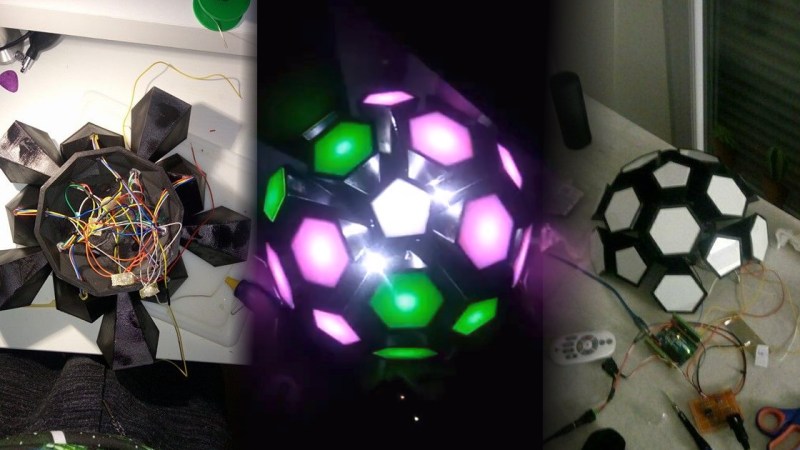MIDI instruments and controllers are fun devices if you want to combine your interest in music and electronics in a single project. Breaking music down into standardized, digital signals can technically turn anything with a button or a sensor into a musical instrument or effect pedal. On the other hand, the receiving end of the MIDI signal is mostly overlooked.
[FuseBerry], a music connoisseur with a background in electronics and computer science, always wanted to build a custom MIDI device, but instead of an instrument, he ended up with a MIDI controlled light show in the shape of an exploded truncated icosahedron ([FuseBerry]’s effort to look up that name shouldn’t go unnoticed). He designed and 3D-printed all the individual geometric shapes, and painstakingly equipped them with LEDs from a WS2818B strip. An Arduino Uno controls those LEDS, and receives the MIDI signals through a regular 5-pin DIN MIDI connector that is attached to the Arduino’s UART interface.
The LEDs are mapped to pre-defined MIDI notes, so whenever one of them is played, and their NoteOn message is received, the LEDs light up accordingly. [FuseBerry] uses his go-to DAW to create the light patterns, but any software / device that can send MIDI messages should do the trick. In the project’s current state, the light pattern needs to be created manually, but with some adjustments to the Arduino code, that could be more automated, something along the lines of this MIDI controlled Christmas light show.
















Midi to DMX. Make Ableton your Light Controller…. https://doktor-andy.de/wordpress/?p=351
Now if the author added a MIDI to DMX bridge, reason being is that at various venues may have dmx lighting but no controller(or pre programmed routines controller possibly requiring a operator) and i find more often than not i have a midi controller of one type or another free(keyboard) but no dmx unit. sure you can drag out a pi+rs485 or pc+ftdi+rs485 but the light would also give you local ‘feed back’too. add a mic to the ADC side of the unit too and is can listen for notes although not sure the old ‘duino has the horse power for FFT and what not but there are ways around that sorta thing.
This is good for a change. I get so tired of light routines that are not in sync with the live music. I was expecting multi-color lights, not just fixed purple and green.
Congratulations on producing the lowest audio level I have yet measured on YouTube. Minus 27 dB! This is measured with wasapi on audacity and amplify. Once recovered to a listenable level I wondered if it was working in the forward direction and at normal speed. Turn it up!
If it’s a MIDI routine controlling the notes, is it really live?
That said, I had no issue with amplitude. In fact, I had it turned down, just loud enough to hear it was synchronised. The music used isn’t my taste, but to each their own. I know I’m a music luddite that thinks Bob Seeger has a point.
Hmm, and that’s one too many ‘e’s… sorry Bob! :-)
I’ve never understood why anyone wants their light organs to be so damn flickery. It doesn’t have to be that way.